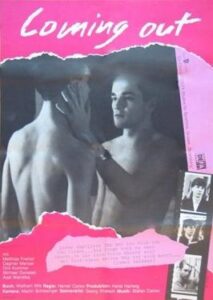Coming Out **** (1989, Matthias Freihof, Dagmar Manzel, Dirk Kummer) – Classic Movie Review 12,498
Heiner Carow’s important, significant and relevant 1989 film Coming Out is the first East German film to deal openly with gay issues. It was the last East German film released before German reunification, premiered the night the Berlin Wall came down.
Director Heiner Carow’s important, significant and relevant 1989 film Coming Out is the first East German film to deal openly with gay issues. It was the last East German film released before German reunification and one of the last films made by DEFA, the East German state film studio, and therefore the only gay-themed feature film it ever made. With downcast gays, rampant and violent homophobia, in East Germany in 1989, how did it ever get made?
Matthias Freihof stars as Philipp, a closeted gay East Berlin high school teacher dating a female colleague, the rather needy and fragile Tanja (Dagmar Manzel), partly to keep up appearances, after colliding with her in a school corridor on his first day at work. A romance quickly develops and they become engaged to be married.
One night, Philipp stumbles into a gay bar, meets and falls in love with a young man Matthias (Dirk Kummer), who has been watching him there from a distance. After a series of agonising events and encounters, Philipp is finally transformed by this love and no longer afraid to face up to who he is, accepting himself as gay, in a rather subtly expressed conclusion. He does however ruin or upset the lives of the folks around him along the way, ie before accepting himself as gay, but that is a different story.
Coming Out is a period piece, with its cigarettes, tight pants and typewriters, a snapshot from a bygone age, but it has kept its currency well, and is a very, very interesting relic of the bad old days of the Eighties. It mixes its drama and political agenda successfully, without much evident strain, making its points forcefully. Freihof is convincing and sympathetic in a difficult role. It is entertaining and revealing, a bit of an education, and also a wonderful time capsule. Carow’s directorial style is good, with travelling camerawork that helps pull you into the story. He makes great use of his fragrant East Berlin locations, giving it a quasi-documentary feel. There is a rather tasteful, though frank scene of lovemaking between Philipp and Matthias, which may have been quite an eye-opener in East Germany at the time.
It is written by Wolfram Witt.
The film premiered at the Kino International in East Berlin on 9 November 1989, the night the Berlin Wall came down. When the news broke that the border between East and West had been opened, the film was stopped and the audience was informed. Most of the audience watched the rest of the film before joining the masses outside.
It won a number of awards including a Silver Bear and Teddy Award at 40th Berlin International Film Festival, and awards at the National Feature Film Festival of the GDR.
It was shot on location in East Berlin and includes scenes shot with amateurs in gay bars and cruising areas of the time. The East German transgender activist Charlotte von Mahlsdorf has a cameo as a barmaid.
East Germany decriminalised homosexual acts in 1968, a year before West Germany following in 1969, but East German gays were harassed and attacked. East Berlin with its gay bars and cruising areas was an oasis for East German gays, but they had to be very careful and discreet, both in private and in the workplace. Philipp’s head teacher is fairly scandalised when she discovers his sexual orientation.
The film must have had the support of Lothar Bisky, the director of the University of Film and Television (Potsdam-Babelsberg), who allowed the scenes in Tanja’s apartment to be filmed in their Berlin home.
The cast are Matthias Freihof as Philipp Klarmann, Dagmar Manzel as Tanja, Dirk Kummer as Matthias, Michael Gwisdek as Achim, Werner Dissel as older gay man, Gudrun Ritter as Waitress Frau Moellemann, Walfriede Schmitt as Philipp’s mother, Axel Wandtke as Jakob, Charlotte von Mahlsdorf as the Barmaid, Pierre Bliss as Araber, René Schmidt as young man in the park, Thomas Gumpert as Larry, Ursula Staack as Wanton, Robert Hummel as Lutz, and Horst Ziethen as lanky boy.
© Derek Winnert 2023 – Classic Movie Review 12,498
Check out more reviews on http://derekwinnert.com


